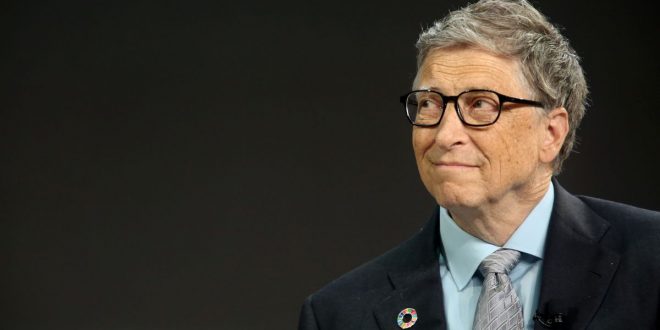The philanthropist Bill Gates has thanked the UAE for its support in working to eliminate deadly diseases and reduce world poverty.
Mr Gates was speaking on the eve of the launch of the 2018 Goalkeepers Report, produced by the Bill and Melinda Gates Foundation, and which measures progress towards goals for sustainable development by 2030 set by the United Nations three years ago.
In an interview with The National, Mr Gates said the foundation was “extremely thankful for the generosity of the UAE, including the ruling family, the government and a lot of organisations there.”
He said the UAE’s support was crucial not just because of the large sums of money it had committed to disease elimination and vaccination programmes, but because its strong regional role meant it was able to engage the support of other governments.
He cited Pakistan and Afghanistan, where the UAE has been active in vaccination campaigns working to eliminate the last clusters of polio in some of the most remote tribal regions.
“There’s an effort there to draw on the entire region and the voice of that region where on issues like the polio campaign, the strong relationships both up into Pakistan and Afghanistan, and relationships going down into some of the countries in Africa have been very helpful in getting to religious leaders and getting the focus from the political leaders on these health issues,” he said.
With the Foundation reaching out to Middle East governments to take leadership roles in fighting world poverty, “the UAE has been particularly strong in this,” Mr Gates said.
This is the second Goalkeepers report, with the name referring to leaders in the public and private sector who are committed eliminating poverty and hunger, achieving better health and education, providing clean and affordable energy and improving the environment.
The UN has set out 17 goals in these areas, and others, including gender equality and water quality, that it wants to achieve by 2030.
The 2018 report, released to coincide with the opening of the UN General Assembly in New York today (September 18), measures progress so far and assesses the probability that these goals will be met.
There is a particular focus on Africa where the Gates Foundation has invested more than US$15 billion (AED55bn) and plans to spend even more in the future.
With the highest percentage of young people in the world, what happens to them “will be the single biggest determinant of whether the world makes progress toward the Sustainable Development Goals – that is, whether life on this planet keeps getting better”, the report says.
Large scale investment in the right areas has already led to historic reductions in global poverty over the last 30 years, the foundation says, from China and India to, most recently, Ethiopia.
It provides evidence that the number of people living in extreme poverty – meaning they survive on less than US$2 a day – has fallen from one in three of the world population in 1990 to less than one in ten by last year.
Over the last 20 years, that represents one billion people, Mr Gates said, while population growth, another measure of improved living standards, is largely flat.
But the overall trend conceals significant regional variations, especially in Africa and other developing countries.
“If you just take Africa, even though it’s only 14 per cent of the population of the world, it’s 24 percent of the births already,” Mr Gates said.
“Over the century, it lights up and becomes half of the births. So, you actually have a lot of population growth in Africa, even though the globe as a whole, the growth isn’t that dramatic.”
Of the 10 countries projected to be the poorest in the world by the middle of this century, all are in Africa. More than six in 10 of those living in the worst poverty will be Africans.
Nigeria alone will see its population explode from 190 million today to 429 million by 2050. Over 150 million of these will be living in abject poverty.
Yet investing in human capital projects in these countries could boost their economies by 90 per cent by that date, creating political and economic stability and stemming the flow of mass migration, the report concludes.
 UAE BARQ برق الإمارات – نبضك
UAE BARQ برق الإمارات – نبضك


